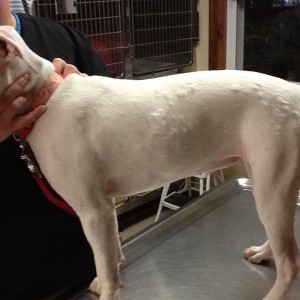 What is a vaccine reaction? Well, first we have to know what a vaccine is so that is where I am going to start.
What is a vaccine reaction? Well, first we have to know what a vaccine is so that is where I am going to start.
The definition of a vaccine is a substance used to stimulate the production of antibodies and provide immunity against one or several diseases, prepared from the causative agent of a disease, its products, or a synthetic substitute, treated to act as an antigen without inducing the disease (Google Dictionary).
So, the main goal of a vaccine is to provide immunity, which is a stimulation of the immune system. This process activates the inflammatory responses. Now we have reached the vaccine reaction potential.
Thus, vaccine reactions in pets can happen immediately or anytime in the 48 hours following vaccination. Here is a list of short-term expected mild reactions that can happen after vaccination:
- Joint and/or muscle soreness
- Lethargy
- Mild Fever
- Reduced Appetite/ Loss of Appetite
- Reluctance to walk/run
- Pain at the injection site
Vaccine reactions can be an allergic reaction to any part of the vaccine, including stabilizers, preservatives, and the actual infectious organism.
Some more life-threatening or serious reactions include:
- Vomiting
- Diarrhea
- Collapse
- Difficulty breathing
- Facial Swelling
- Itchy/bumpy skin (Hives)
- Shock
- Sudden death
If any of these symptoms occur, please seek medical help IMMEDIATELY!
There are also injection site reactions, which are different than vaccine reactions. These include:
- Site of injection is still painful after 2 days
- Lump that continues to grow at the injection site
- Lump that is still present after 1 month
So, how do we prevent vaccine reactions well?
- Be sure your veterinarian knows your pet had a reaction, what the reaction was, and what vaccine caused the reaction
- Avoid giving several vaccinations at once, but rather spread them over time
- Don’t vaccinate at a vaccination clinic if your dog has had a reaction before, because they are not equipped to individualize treatment which your pet needs
- In extreme cases, avoid the vaccination altogether, (if your veterinarian feels this is the proper course).
If your pet does have a reaction, there are ways your veterinarian can manage them by pre-medicating with antihistamines and/or corticosteroids to help your pet react normally to vaccines.

